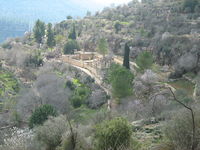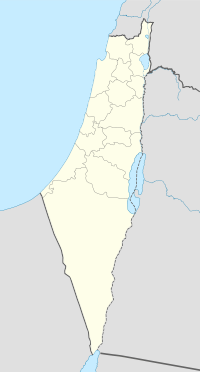Sataf
| Sataf | |
|---|---|

Remains of Sataf village
|
|
| Arabic | صطاف |
| Name meaning | from a personal name |
| Subdistrict | Jerusalem |
| Coordinates | 31°46′8.76″N 35°7′38.28″E / 31.7691000°N 35.1273000°ECoordinates: 31°46′8.76″N 35°7′38.28″E / 31.7691000°N 35.1273000°E |
| Palestine grid | 162/130 |
| Population | 540 (1945) |
| Area | 3,775 dunams |
| Date of depopulation | July 13–14, 1948 |
| Cause(s) of depopulation | Military assault by Yishuv forces |
Sataf (Arabic: صطاف, Hebrew: סטף) is a tourist site showcasing ancient agricultural techniques used in the Jerusalem Mountains. Before 1948 it was a Palestinian Arab village in the Jerusalem Subdistrict depopulated during the 1948 Arab–Israeli War. It is located 10 km west of Jerusalem, with Sorek Valley (Arabic: Wadi as-Sarar) bordering to the east.
Two springs, Ein Sataf and Ein Bikura flow from the site into the riverbed below.
A monastery located across the valley from Sataf, i.e. south of Wadi as-Sarar, known by local Arabs as Ein el-Habis (the "Spring of the Hermitage"), is officially called Monastery of St. John in the Wilderness.
Remains of a 4,000 BCE Chalcolithic village were discovered at the site. The related traces of agricultural activities number among the oldest in the region.
Most ancient remains date to the Byzantine period.
The first written mention of the site is from the Mamluk era.
In the late Ottoman period, in 1863, Victor Guérin described a village of one hundred and eighty people. He further noted that their houses were standing on the slopes of a mountain, and that the mountainside was covered by successive terraces. An Ottoman village list from about 1870 counted 38 houses and a population of 115, whereby only men were counted.
In 1883, the Palestine Exploration Fund's Survey of Western Palestine described Setaf as "a village of moderate size, of stone houses, perched on the steep side of a valley. It has a spring lower down, on the north."
By the 1922 census of Palestine conducted by the British Mandate authorities, Sataf had a population of 329; 321 Muslims and 8 Christians. All the Christians were Roman Catholic. The 1931 census lists 381 inhabitants; 379 Muslim and 2 Christian, in a total of 101 houses.
...
Wikipedia

